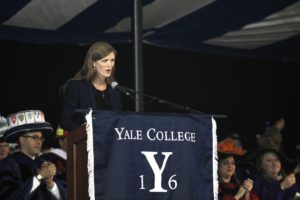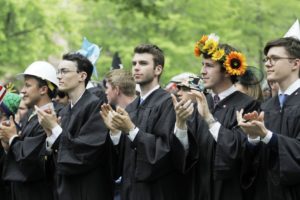
Standing before more than 1,000 members of the Class of 2016 clad in traditional Class Day hats, keynote speaker and U.S. Ambassador to the United Nations Samantha Power ’92 challenged graduating seniors to “get close” to the issues they aim to change.
In a Sunday afternoon address to an audience of several thousand, Power — known for putting herself at the forefront of the fight for human rights — spoke about the importance of taking risks, whether on the international stage or at Yale. She drew on her own experience as Ambassador to the UN to highlight continuing gender and racial inequalities, tying the struggles she has seen across the world to issues of naming and faculty diversity on Yale’s campus. In the pursuit of justice and equality, Power said her central message was for graduates to invest themselves fully and closely to their pursuits.
“If you are setting out to make a slice of the world better, you must go in knowing that real change often requires a long struggle,” Power said. “While history may not be in a hurry, you can and you must speed it up.”
After an introduction from Class Day chairs Katayon Ghassemi ’16 and Benjamin Ackerman ’16, Powers drew laughter by calling herself a “rando” compared to recent Class Day speakers Secretary of State John Kerry ‘66 and Vice President Joe Biden. Her address then turned serious, as she urged the Class of the 2016 to “go all in” when tackling injustices and inequalities.
Power said making a difference requires both “patience and impatience,” as well as a willingness to learn about issues first hand and understand the perspectives of others.
“The message isn’t to go stand in front of a tank or report on civil war,” Power said. “The message is don’t do things at remove, invest yourself fully. Get close.”

The ambassador drew on the life of Pauli Murray LAW ’65, who was recently honored as the namesake of one of Yale’s two new residential colleges, to demonstrate the profound sense of self worth that comes from fighting for the dignity of others. Power said that while at the time it may have seemed as though Murray had lost important fights, each of her battles chipped away at societal inequalities.
But Power also emphasized that, despite claims to the contrary, societal prejudices remain. She noted that the University has never had a long-term female president and that only four other women have spoken at Class Day since Power’s own graduation in 1992. She also made reference to the University’s recent decision to retain the namesake of Calhoun College to demonstrate the entrenched nature of racial biases.
“You may have felt [these biases] living in a college named after someone who once argued enslaving your ancestors was a positive good,” Power said.
Power also drew on her formative years as an undergraduate at Yale to drive home the importance of maintaining humility while moving past personal insecurities and feelings of self-doubt. As a freshman, Power said she invested little energy into her academics and extracurricular activities.
“When you risk little, you can’t be disappointed if you don’t excel,” Power said. “You are not failing to thrive, you just aren’t trying.”

Power spoke about the two “lightning bolts” that jolted her away from her complacency. At the end of her freshman year, one professor wrote her a note “eviscerating” her disrespectful lack of commitment. Then, during the summer of 1989, Power watched Chinese students risk their lives during the Tiananmen Square massacre. Those protestors had the courage to take risks in order to make change, she said — as should the Class of 2016.
Following Power’s speech, Yale College Dean Jonathan Holloway, Athletics Director Tom Beckett and Pierson College Head Stephen Davis presented prizes to high-achieving members of the Class of 2016. The nine awards, given to 11 members of the Class of 2016, honored excellence in athletics, scholastic pursuits and character. Among the recipients, Aaron Berman ’16 was awarded the Alpheus Henry Snow Prize for a “combination of intellectual achievement, character and personality.” Eshe Sherley ‘16 and Sebastian Medina-Tayac ‘16 received the Nakanishi Prize for demonstrating academic excellence, as well as leadership in improving race or ethnic relations at Yale College. Both Sherley and Medina-Tayac have been leaders in recent campus conversations about racism and discrimination.
Interspersed between the prizes were Class Day reflections from Daniel Rietze ’16 and Jacob Osborne ’16. Rietze celebrated the “unexpected friendship” that arose between him and his freshman year roommate, while Osborne’s comic reflection offered a more lighthearted perspective.
“We did it. We’re done,” Osborne said. “This may not be the most popular thing to say right now, but good riddance … at some point, enough is enough.”
Before introducing the final student speaker, Ackerman and Ghassemi honored retiring head of Jonathan Edwards College Penelope Laurans — a Class Day advisor and long-time University administrator — with a specialized hat.
Emtithal Mahmoud ’16, who delivered the annual “Ivy Ode,” was the afternoon’s final speaker. Though traditionally a performance of Latin Sapphic stanzas, Mahmoud — who won the Individual World Poetry Slam title in the fall — performed a spoken word poem titled “Something Loud and Beautiful.”
“Here’s to the others, those with us and those we’ve lost,” Mahmoud said. “Here’s to one another, to this rolling sea of faces that has come to mean my Yale.”
The afternoon concluded with the annual Class Day video, a short film produced by Daniel Matyas ’16, Emily Bosisio ’16 and Katrina Ungewitter ’16. The film featured cameo appearances from well-known alumni including journalist Anderson Cooper ’89, musician Kevin Olusola ’11 and Buzzfeed’s Ned Fulmer ’09 as well as recording artist LL Cool J and journalist Wolf Blitzer.
Following the series of farewells, the graduating class sang “Bright College Years,” waving white handkerchiefs, just as they did at their freshman address in August 2012.
Maya Sweedler contributed reporting.







